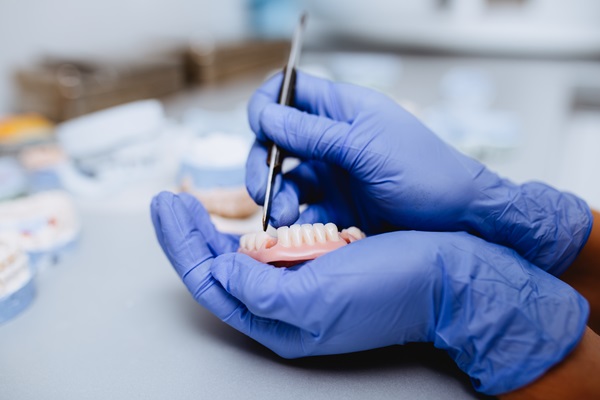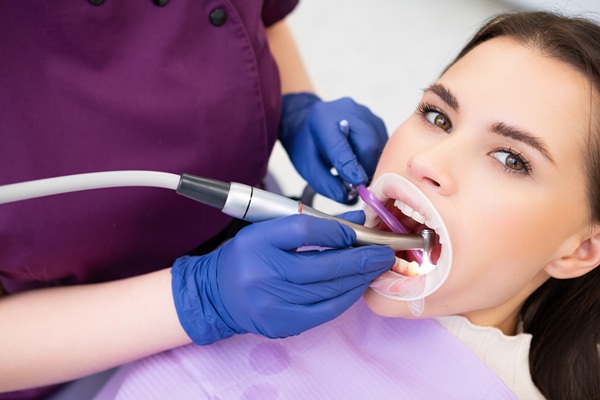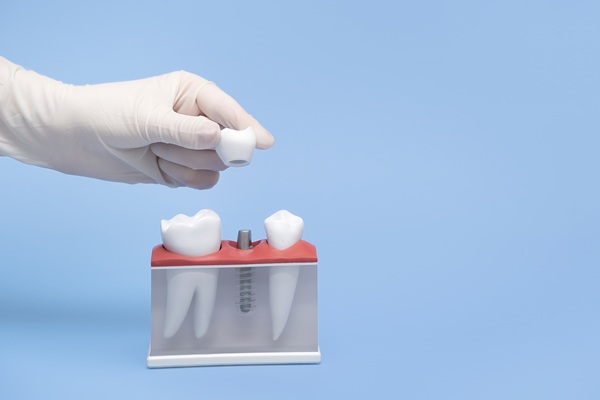What Questions You Should Ask Your Dentist About Adjusting to New Dentures

Dentures can restore normalcy to the functions of chewing and eating, but for first-time wearers, there is a period spent adjusting to new dentures. By asking a dentist about this transitionary period, it is possible to minimize the discomfort and awkward mishaps that often accompany getting used to a new dental appliance. In addition, dealing with multiple patients and various experiences gives a dentist sound advice and insight on how to adjust to partial or full dentures.
Important questions to have answered
After a new pair of dentures is placed, it is important to consult the dentist about storage, maintenance, and adjustment needs. Understanding the adjustment process can help ease fears, prevent frustrations, and create confidence in the restoration the dentures have provided. These questions will help a patient obtain as much information as possible about new dentures.
1. How long does the adjustment process take?
The length of time needed to adjust to new dentures varies by patient, but it is common for the patient to take up to a month before feeling confident and normal in the new set of teeth. This is because the lips, gums, and tongue all need to get used to the dentures and the new sensations and pressures the appliance puts on the various mouth areas.
2. What discomfort or pain should be recognized as abnormal?
A minor amount of pain or discomfort is normal as the gums adjust to the placement and pressure of the dentures. If the level of pain below or above the dentures continues to worsen, it could indicate that excessive rubbing is occurring on account of poorly fitting dentures. Bacteria could build up underneath the dentures and create sores (a type of thrush), potentially leading to pain from inflammation. Extreme pain that occurs while chewing could indicate bone resorption has occurred from dentures rubbing improperly along the gumline.
3. Are there dietary restrictions when adjusting to new dentures?
During the first few days of the transitionary period, it is important to restrict the diet to soft foods. This can help alleviate too much pressure from being put on the gums and jaw. Once a patient can tolerate harder foods, it is recommended that food be cut up into bite-sized pieces and chewed on the back or sides of the mouth. Avoid tough meats and sticky or chewy candies, as well as hard, crunchy items. Consume hot and cold foods carefully, as dentures can heighten temperature sensitivities.
4. Should special maintenance or storage products be used with new dentures?
Dentures should not be left in the open air when not in use in order to preserve the shape. Store them inside a plastic bag and wrap in a damp cloth or leave them soaking in a glass with clean water. Do not use boiling water to clean or soak dentures. Dentures should be brushed daily using a denture cleanser, but ensure proper oral hygiene is being maintained as well to avoid infections or bacteria buildup.
5. Will dentures slip around and fall out?
Dentures that fit correctly should remain relatively stable and in place, assuming you are taking good care of them and avoiding harmful foods and habits. While denture adhesives can help provide some extra security, they should only be used sparingly. Zinc is a primary ingredient in many of these types of products, and overuse can lead to a buildup of this mineral in the body, resulting in gradual nerve damage. If you find that you are relying on denture adhesive for a proper fit, or if you need to use it frequently, it may be time to see your dentist for adjustments, repairs, or a new appliance.
Patients who are concerned about their dentures slipping or falling out may want to discuss transitioning to implant-supported dentures. This option, also referred to as permanent or snap-on dentures provides incredible security while also preventing long-term bone loss at the implant sites. However, the process is invasive and may not be appropriate for some patients. A dentist can help you determine whether or not this is a viable treatment plan for your tooth loss.
Conclusion
The process of adjusting to new dentures is easier to navigate when all the information has been presented. Talk to a dentist about what to expect with this restorative solution, and do not be afraid to ask many questions so you can be well prepared.
Request an appointment here: https://smilesdental.com or call Smiles Dental Care at (650) 563-1180 for an appointment in our Mountain View office.
Check out what others are saying about our dental services on Yelp: Dentures and Partial Dentures in Mountain View, CA.
Recent Posts
Removable artificial teeth are called dentures. They replace permanent teeth lost or extracted due to damage or extensive decay. False teeth are a traditional dental restoration method that has been around for centuries and is still effective today. However, there are things you need to know about them before you start wearing them.Your dentist can…
Getting dentures is the most affordable way to restore lost teeth. These removable dental replacements are easy to acquire as well. Upper and lower dental replacements are custom-fit. Your dentist can recommend them under the right conditions. If you want to know when dentures can replace missing teeth, here are the details.Dental implants are the…
While it typically varies from person to person, dentures usually last somewhere between five to ten years. However, they might need to be readjusted from time to time to give the wearer a more comfortable fit.The longevity of a set of dentures depends on a number of factors like the quality of the material used…
Partial dentures, just like any other oral appliance, can be tough to adjust to at first. However, with the help of a trained dentist, you can adjust easily so that things like eating feel normal. Knowing what you can and cannot eat when wearing partial dentures can be helpful for someone who isn’t sure. Partial…


